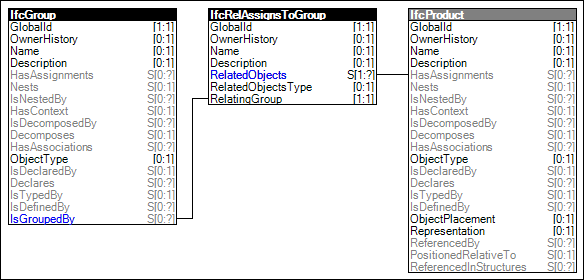
Figure 3 — Group Assignment
Group Assignment established an arbitrary collection of objects within a group. The grouping relationship does not apply any other meaning then grouping objects under some aspect. It is non-hierarchical, that is objects can be grouped into different logical groups, and it does not interfere with other relationship concepts, such as ObjectAggregation.
The Group Assignment concept establish a given object as being the group collection for other objects. An IfcZone is a specific group object for collecting spaces, IfcDistributionSystem is a specific group object for collecting distribution elements. Usually a grouping relationship is applied to group elements for a particular purpose or function. It usually implies the existence of a grouping relationship and the provision of some identity under which the group is characterized.
NOTE The IfcGroup maybe not yet have a grouping relationship established, it then identifies an empty group.
EXAMPLE An air handler belonging to an air conditioning system is an example of such group assignment.
Figure 3 illustrates an instance diagram.
 |
Figure 3 — Group Assignment |
<?xml version="1.0"?>
<ConceptTemplate xmlns:xsi="http://www.w3.org/2001/XMLSchema-instance" xmlns:xsd="http://www.w3.org/2001/XMLSchema" uuid="f567967f-5493-44d9-ac51-937c09ac2583" name="Group Assignment" applicableSchema="IFC4" applicableEntity="IfcGroup">
<Rules>
<AttributeRule RuleID="IsGrouped" AttributeName="IsGroupedBy">
<EntityRules>
<EntityRule EntityName="IfcRelAssignsToGroup">
<AttributeRules>
<AttributeRule RuleID="RelatedObjects" AttributeName="RelatedObjects">
<EntityRules>
<EntityRule EntityName="IfcProduct" />
</EntityRules>
</AttributeRule>
</AttributeRules>
</EntityRule>
</EntityRules>
</AttributeRule>
</Rules>
</ConceptTemplate>